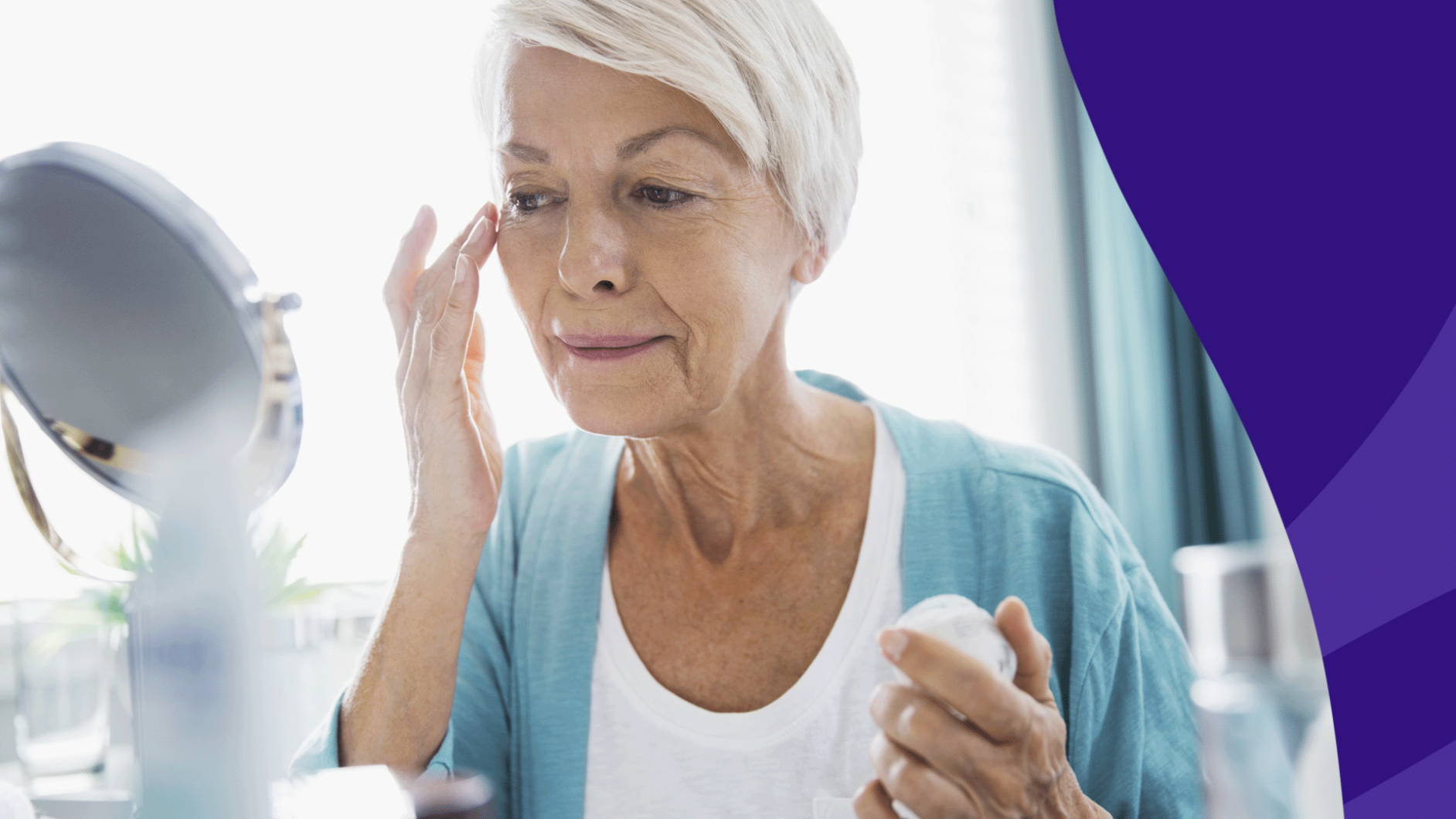Here’s a little secret: You don’t need to buy every expensive serum on the market to maintain glowing skin. A small arsenal of reliable products will do just fine. Some products and ingredients can’t back up their claims or benefit every skin type, but if you spot niacinamide on the label, you could have a winner.
Niacinamide is a form of vitamin B, a derivative of niacin (nicotinic acid), responsible for various skincare benefits. It can reduce wrinkles, lighten dark spots, regulate oil production, and treat acne—and that’s just the start. Read on for a deep dive into the potential benefits of niacinamide.
9 health benefits of niacinamide
There’s a reason niacinamide is a staple in skincare routines and a top dermatologist recommendation. Actually, there are nine reasons. Here’s a look at niacinamide’s research-backed benefits.
1. It can help treat acne
Acne is the plight of puberty-stricken teenagers everywhere, prompting frantic face examinations and emergency makeup applications. But it isn’t just for adolescents—adults can get it, too. Fortunately, there are plenty of treatments, and niacinamide’s anti-inflammatory properties might make it a worthy addition to your acne-fighting toolkit.
Inflammation and redness are two of the most common acne symptoms, and niacinamide may reduce both of them. In fact, a study from 2021 found that supplementing a 2.5% benzoyl peroxide cream with 5% niacinamide reduced acne lesions and oily skin better than benzoyl peroxide alone. Even though both topical and oral versions have shown some promise, more research is necessary to determine whether niacinamide can fight acne without benzoyl peroxide.
2. It might prevent signs of aging
Mark Twain said, “Wrinkles should merely indicate where smiles have been,” but that doesn’t mean everyone wants them. Not every anti-aging serum on the market is worth the time, but there’s some evidence that niacinamide might be.
“Niacinamide enhances collagen production primarily by stimulating fibroblasts, the cells responsible for collagen synthesis. Its antioxidant properties protect against free radical damage, safeguarding collagen. It also bolsters the skin’s barrier function and hydration, creating an optimal environment for collagen production and maintenance,” says Cameron Rokhsar, MD, founder and medical director of the New York Cosmetic, Skin, and Laser Surgery Center. “Collagen is important for skin elasticity because it is a building block of the dermis. It is considered a basement membrane protein, giving structural integrity to the skin.”
That means it could be a good option for preventing or reducing the appearance of fine lines and wrinkles. In a study published in Dermatologic Surgery, 50 women with signs of aging applied niacinamide to one-half of their faces twice a day, and after twelve weeks, they showed significant reductions in fine lines, wrinkles, hyperpigmented spots, blotchiness, and skin yellowing.
3. It could reduce the appearance of dark spots
Dark spots on the skin, or hyperpigmentation, can come from sun exposure, certain medications, aging, or genetics. It often occurs when melanosomes—which synthesize melanin—travel to skin cells called keratinocytes. According to one study from 2002 and another one from 2005, niacinamide can inhibit this transfer, reducing the appearance of dark spots.
“Niaciamide’s anti-inflammatory properties play an important role here, too,” Dr. Rokhsar says. “This is crucial, as intense inflammation often precedes hyperpigmentation; therefore, by curtailing inflammation, the risk of hyperpigmentation is significantly reduced.” Niacinamide serums or creams, applied twice daily, are usually a good bet for reducing hyperpigmentation.
4. It can help regulate oil production
Oil is a good thing. It helps protect and hydrate the skin. But like other good things, too much of it can cause problems. In this case, that could mean clogged pores, blackheads, and pimples. “Niacinamide is particularly effective in controlling sebaceous gland oil production, helping prevent excessive oiliness,” Dr. Rokhsar says. Applying it topically can suppress the sebaceous glands, reducing a substance called sebum, which is a component of skin oil.
There’s not a lot of research to back this up. However, one study of 100 women found that niacinamide decreased the sebum excretion rate in Japanese subjects and reduced casual sebum levels in Caucasian subjects. The sebum excretion rate is the skin surface lipid flow of a previously cleaned area, while casual sebum levels refer to the amount of sebum on unprotected, unwashed skin.
5. It can hydrate the skin
Hydrated skin is happy skin. When it’s hydrated, the skin looks smoother and softer, regulates oil production, reduces the appearance of wrinkles, and protects against ultraviolet (UV) light. That’s why moisturizers are so widely recommended by dermatologists. “Ceramides are lipids that play a crucial role in maintaining the skin’s barrier and retaining moisture,” says Navin S. Arora, DO, founder of Borealis Dermatology. “By boosting ceramide levels, niacinamide helps to keep skin hydrated and reduce water loss.” It could work especially well when paired with hyaluronic acid, another moisture-loving skin supplement.
A study performed on subjects with atopic dermatitis (eczema) found that a 2% niacinamide formula decreased water loss and increased epidermal hydration even better than petroleum jelly.
6. It might help protect against skin cancer
Sun protection is irreplaceable for skin cancer prevention, but niacinamide might help as well, specifically for people at high risk. A recent meta-analysis of 29 different trials found that oral nicotinamide (also known as niacinamide) was associated with a significant reduction in skin cancers among people with a history of skin cancer and organ transplant recipients whose donors had a history of skin cancer.
The results of a randomized trial published in The New England Journal of Medicine echo that conclusion, showing a decrease in the rates of new nonmelanoma skin cancers among high-risk subjects. This applies primarily to oral nicotinamide, not niacinamide creams.
7. It can protect the skin
Between exposure to UV light, indoor and outdoor air pollution, dust, and other airborne particulates, skin takes a daily beating—and research shows those exposures can generate free radicals and cause oxidative stress or cell damage. Niacinamide, however, can help protect epidermal cells against that damage by fortifying the natural skin barrier.
Niacinamide can actively block certain particles from oxidizing the lipids and proteins in skin cells and protect keratinocytes from cell damage, according to a study from 2019. Plus, a study published by the American Academy of Dermatology found that niacinamide could reduce the microdamage from ultraviolet exposure. That doesn’t mean it can take the place of sunscreen—just that it could provide some additional UV protection.
8. It may reduce pore size
One of the most common causes of large pores is oily skin. Since niacinamide can help regulate sebum production and boasts anti-inflammatory properties, it may also make pores look smaller. “While it may not physically reduce the size of pores, niacinamide can help improve the appearance of enlarged pores,” Dr. Arora says. “It does this by promoting skin elasticity and reducing inflammation, which can contribute to a more refined skin texture and the appearance of smaller pores.”
Applying topical niacinamide twice per day may be enough to make pores look smaller. In a study from the Journal of Cosmetic Dermatology, subjects used a 4% niacinamide cream for eight weeks, and their pores decreased in appearance by 14.7%.
9. It might aid in digestion
According to Dr. Arora, “When taken orally, niacinamide can aid in the digestive process as part of its role in the body’s metabolism. It helps in the conversion of food into energy and plays a role in the digestive, nervous, and skin health systems.”
However, he says its effects on the digestive system aren’t quite as direct as the skin benefits of a topical niacinamide treatment.
How to use niacinamide
To get healthy-looking skin, you have to administer niacinamide the right way.
How to use topical niacinamide
Niacinamide is primarily a skincare product, so applying it directly to the skin is typically the best way to use it. Niacinamide serum or cream often comes in concentrations of 1% to 5% but can go as high as 10%. Dr. Rokhsar recommends looking for serums with a niacinamide concentration of 5% to 10%, applying it once or twice a day on clean skin, and not applying anything on top of it for at least 15 minutes.
“Check for additional ingredients that complement niacinamide’s effects,” he suggests. “For example, hyaluronic acid for hydration, ceramides for barrier repair, peptides for anti-aging, and antioxidants like vitamin C and E for additional skin protection and brightness.”
How to use oral niacinamide
Most of the scientific studies on niacinamide focus on topical administration, but oral niacinamide can also boost skin health. A study from 2017 showed that it could help treat acne, and The New England Journal of Medicine proved it to be effective in reducing the development of precancerous growths. It often comes in tablet or pill form. Even though it’s available over the counter, it’s best to speak with a healthcare provider before choosing a dosage.
Niacinamide in your diet
Technically, foods contain niacin, not niacinamide. However, the human body can convert niacin to niacinamide, so certain foods could be a good source. Foods rich in niacin include red meat, fish, chicken, beans, nuts, brown rice, cereal grains, and avocados. Including niacin-rich foods in your diet might not provide noticeable skin benefits, though.
Can you use niacinamide every day?
Yes! Niacinamide is a water-soluble vitamin, so it won’t build up in the body, making it safe for daily use in its topical and oral forms. However, it might cause side effects when taken in doses of more than 1,000 milligrams or applied topically in high concentrations.
Niacinamide side effects
Even though niacinamide is considered safe, there’s still a chance it could cause negative side effects, particularly when it is over-consumed or over-applied. Side effects of its oral supplement form include upset stomach, gas, lightheadedness, muscle pain, headache, and weakness. Potential side effects of topical niacinamide include skin irritation, redness, itching, and burning—especially for people with sensitive skin.
Niacinamide may interact with a few different drugs. Although not severe, they’re still worth discussing with a doctor. For example, it could decrease the body’s efficiency in breaking down Tegretol (carbamazepine) and Mysoline (primidone)—drugs used to control seizures. Since it also can slow blood clotting, it can compound the effects of anticoagulants to increase the risk of bruising and bleeding. It might also interact with medications that lower blood pressure or cholesterol, so anyone taking them should consult a doctor before using niacinamide.
There’s also some evidence that long-term use of niacinamide at high doses may cause liver damage, so people with pre-existing liver conditions or those taking medications that might harm the liver should use caution. It might also aggravate gallbladder disease and gastric ulcers.
Can you use niacinamide when pregnant?
Many drugs can cause issues during pregnancy, but niacinamide isn’t one of them. While more research is needed, it’s generally considered safe for pregnant women, especially its topical versions. One study from 2018 even suggested that it might help prevent miscarriages. However, the American Pregnancy Association says pregnant women shouldn’t take more than 18 mg per day.
Bottom line
Healthy, vibrant skin looks great, feels great, and can provide a dose of confidence. When it comes to assembling an effective skincare routine, niacinamide is a popular choice—and for good reason. It’s got research-backed evidence of treating acne, dark spots, oily skin, and signs of aging, making it one of the most versatile options on the market. Just be sure to consult a doctor, dermatologist, or other healthcare professional before starting a consistent niacinamide regimen.
Sources
- Nicotinic acid/niacinamide and the skin, Journal of Cosmetic Dermatology (2004)
- Clinical comparison of topical 2.5% benzoyl peroxide plus 5% niacinamide to 2.5% benzoyl peroxide alone in the treatment of mild to moderate facial acne vulgaris, The Journal of Clinical and Aesthetic Dermatology (2021)
- Niacinamide: A B vitamin that improves aging facial skin appearance, Dermatologic Surgery (2005)
- The effect of niacinamide on reducing cutaneous pigmentation and suppression of melanosome transfer, The British Journal of Dermatology (2002)
- Effective inhibition of melanosome transfer to keratinocytes by lectins and niacinamide is reversible, Experimental Dermatology (2005)
- The effect of 2% niacinamide on facial sebum production, Journal of Cosmetic and Laser Therapy (2006)
- Moisturizing effects of topical nicotinamide on atopic dry skin, International Journal of Dermatology (2005)
- Effect of nicotinamide in skin cancer and actinic keratoses chemoprophylaxis, and adverse effects related to nicotinamide: A systematic review and meta-analysis, Journal of Cutaneous Medicine and Surgery (2022)
- A phase 3 randomized trial of nicotinamide for skin-cancer chemoprevention, The New England Journal of Medicine (2015)
- Free radicals and extrinsic skin aging, Dermatology Research and Practice (2012)
- Niacinamide protects skin cells from oxidative stress induced by particulate matter, Biomolecules & Therapeutics (2019)
- Ability of topical 5% niacinamide to reduce ultraviolet light–induced erythema, barrier disruption, and inflammation, Journal of the American Academy of Dermatology (2013)
- The efficacy and adverse effects of treatment options for facial pores: A review article, Journal of Cosmetic Dermatology (2022)
- The role of nicotinamide in acne treatment, Dermatologic Therapy (2017)
- Vitamin B3 nicotinamide: A promising candidate for treating preeclampsia and improving fetal growth, The Tohoku Journal of Experimental Medicine (2018)
- Roles of vitamin B in pregnancy, American Pregnancy Association











